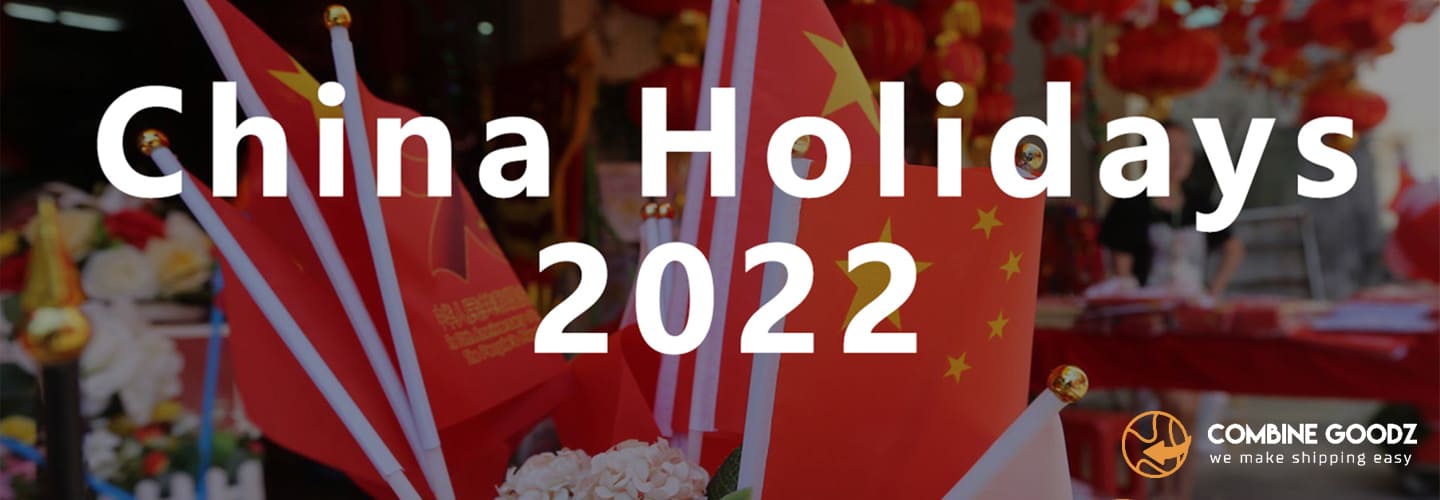
If you work with Chinese manufacturers, you should be well aware of the potential for production delays throughout the year. Although many companies are already aware of their suppliers' Chinese New Year plans, China has a few other known public holidays that could negatively impact lead times and logistics. Therefore, it should be factored into your ordering timeline when issuing purchase orders. This article will provide you with information about China's eight major national public holidays.
Table of Contents:
What are the eight major China holidays? How long do China holidays last? |
Download 2022 China's holiday calender for your desk:
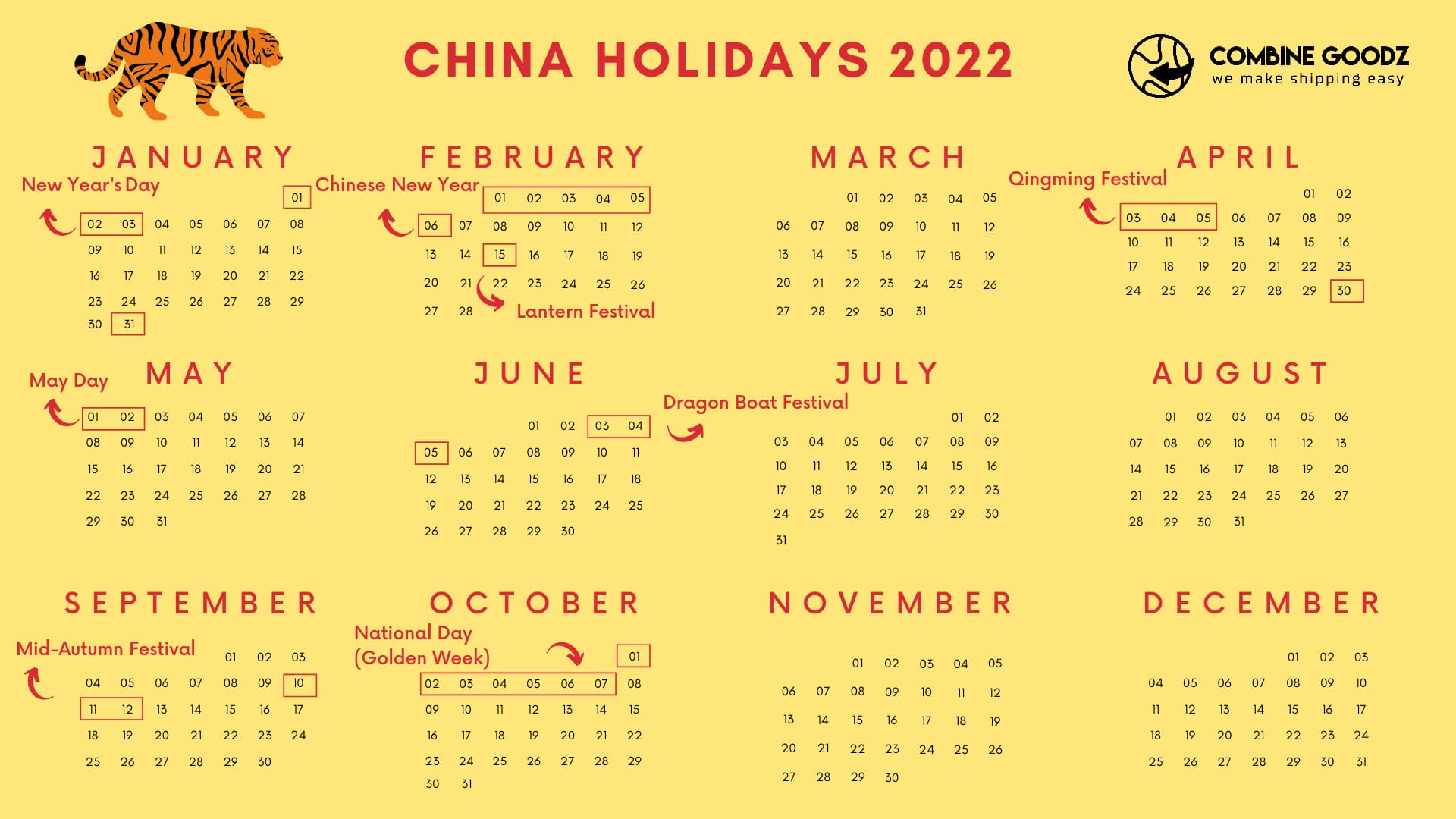
What are the eight major China holidays?
Quickview of Chinese Public Holidays in 2022:
| Date | Holiday | Chinese |
Jan. 1st - Jan. 3rd | New Year's Day | 元旦 |
Jan. 31st - Feb. 6th | Chinese Spring Festival | 春节 |
February 15th | Lantern Festival | 元宵节 |
April 3rd - April 5th | Qingming Festival | 清明节 |
April 30th - May 2nd | Labor Day | 劳动节 |
June 3rd - June 5th | Dragon Boat Festival | 端午节 |
Sept.10th - Sept.13rd | Mid-Autumn Festival | 中秋节 |
Oct. 1st - Oct. 7th | National Day Holiday | 国庆节 |
1. New Year's Day
The first Chinese holiday of the year is New Year's Day, which is the same as in the Western world. People celebrate this holiday on January 1st and schools and public offices are closed for a day.
To distinguish it from the Chinese Lunar New Year, some people refer to New Year's Day as "International New Year."
2. Chinese New Year
Chinese New Year, also known as Spring Festival, is the second major public holiday of the year and also is the most important one. Since it is based on the Chinese lunisolar calendar, the actual date varies from year to year, but it's usually celebrated in late January or early February.
This festival dates back around 4,000 years and is a long-standing tradition in China and other Asian countries such as Vietnam and Singapore.
Like Easter, Christmas, or Thanksgiving, people travel back to their home towns to spend time with their families. Chinese people bring presents and red envelopes, also called "Hongbao", with money inside to give to their loved ones. People will decorate their doors with red paper-cuts wishing their family good fortune and happiness and families will eat together and light firecrackers.
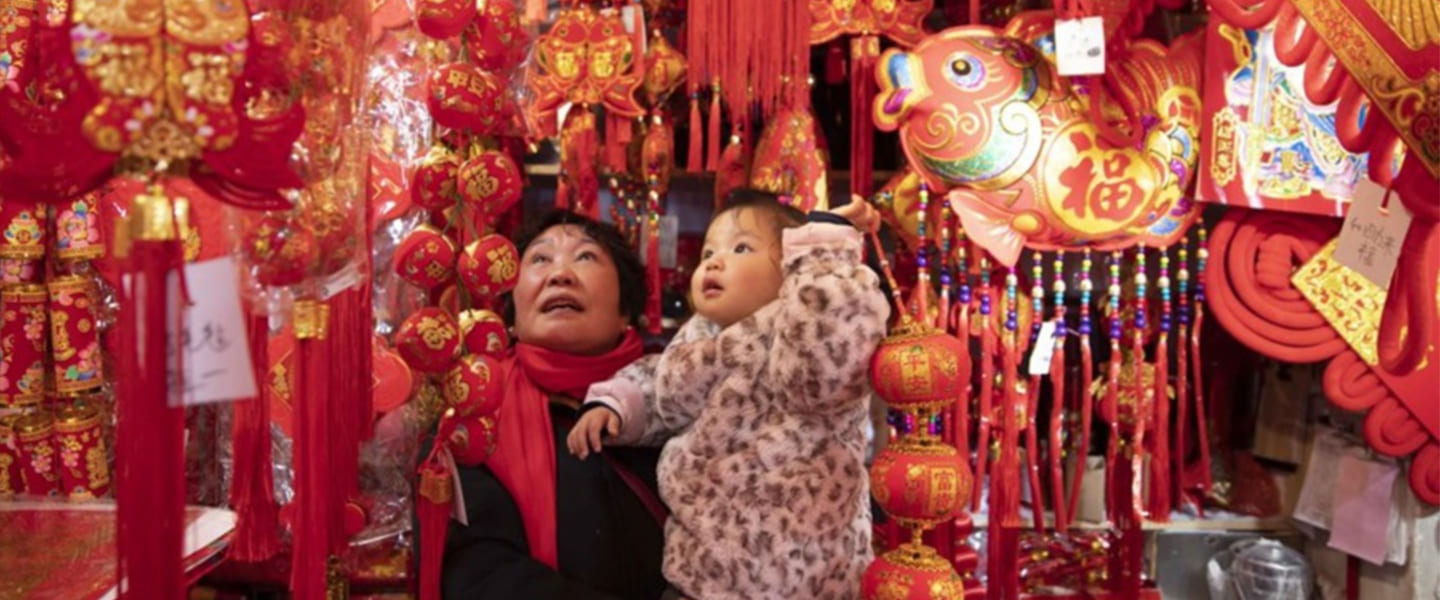
3. Lantern Festival
The festival marks the final day of the Chinese New Year and is celebrated in February or March.
During the festival, people will light lanterns. The lanterns can symbolize that you are letting go of your old self and starting fresh. Just like when in Western people jump down from the chair on New Year's Eve and start planning their new life.
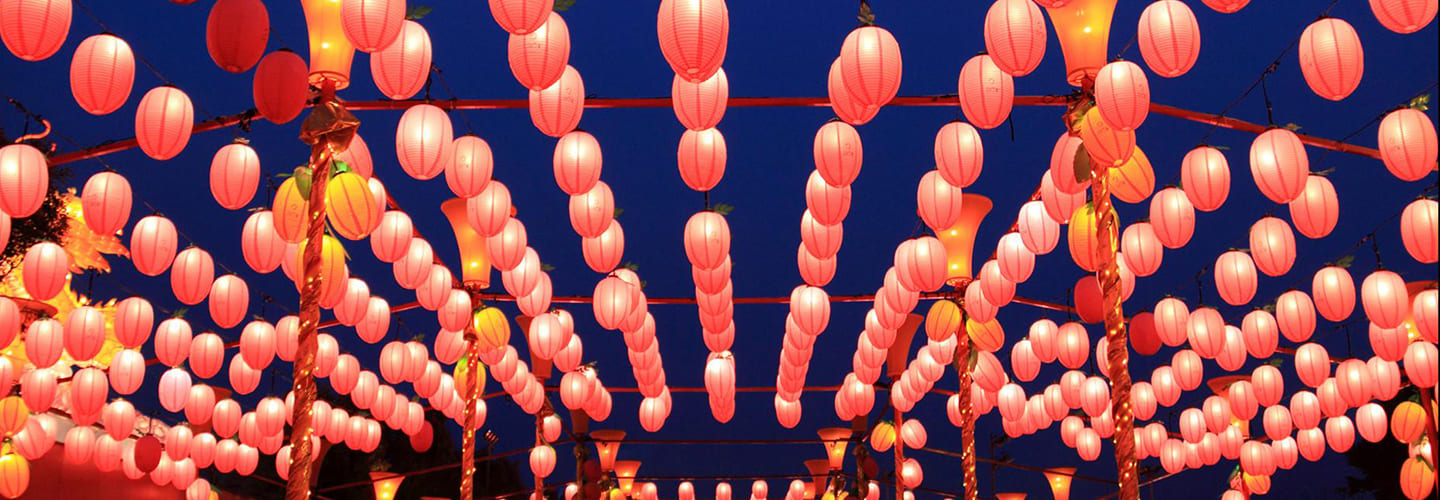
4. Qingming Festival
This festival is also known as Tomb-Sweeping Day or Ancestor's Day, which symbolizes the Chinese people’s deep-rooted respect for their ancestors. Qingming Festival falls on the 15th day after the Spring Equinox, which can be either April 4th, 5th or 6th in any given year.
On this day, Chinese families traditionally clean and sweep their ancestors' tombs. Many people also leave offerings of fake paper money, also known as "hell money," near or on their ancestors' graves so that their loved ones can make purchases in the afterlife.
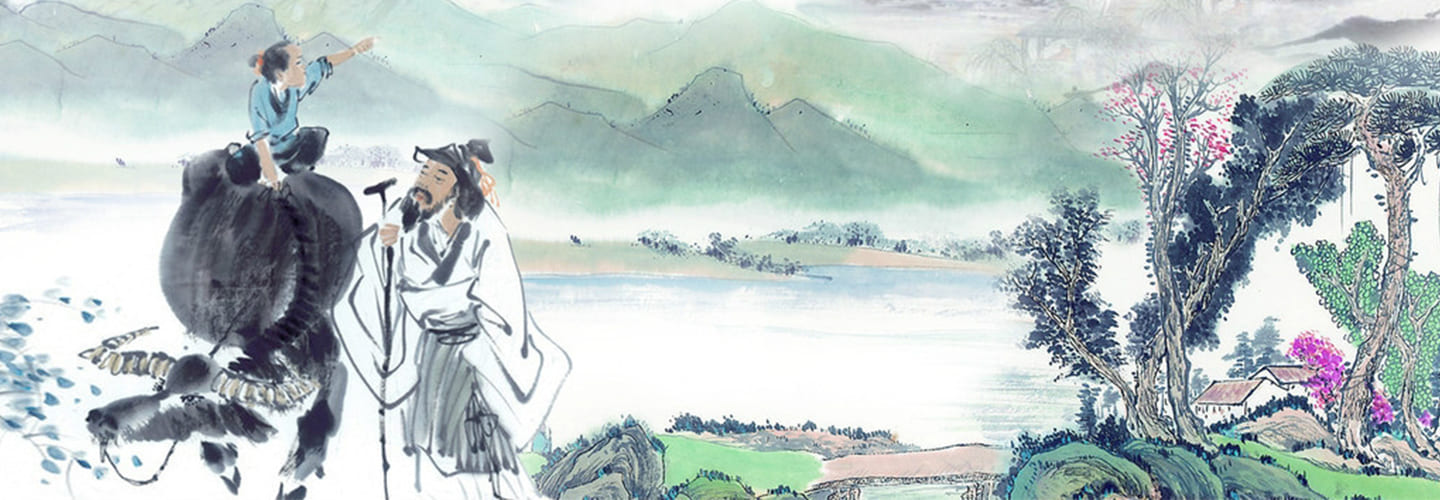
5. Labor Day
Labor Day is also called May Day in China. This holiday, which honors workers of all types, normally lasts three days.
6. Dragon Boat Festival
With over 2,000 years of history, Dragon Boat Festival is one of the most traditional Chinese festivals. It falls on the fifth day of the fifth month of the Chinese calendar, typically in June on the Gregorian calendar.
There is a variety of stories about the origin of the festival, but the best-known legend behind the Dragon Boat Festival is that it commemorates the death of Qu Yuan, a poet and politician who lived circa 340 to 278 BCE.
According to legend, Qu Yuan was accused of treason and expelled from politics. In despair, he committed suicide by drowning himself in the Miluo River. He was popular with the local people, and after his death, they rushed to their boats to save him or at least recover his body. This is the origin of the festival’s most famous activity: dragon boat races.
Several traditional dishes are served during the festival, including zongzi (sticky rice dumplings) and realgar wine.
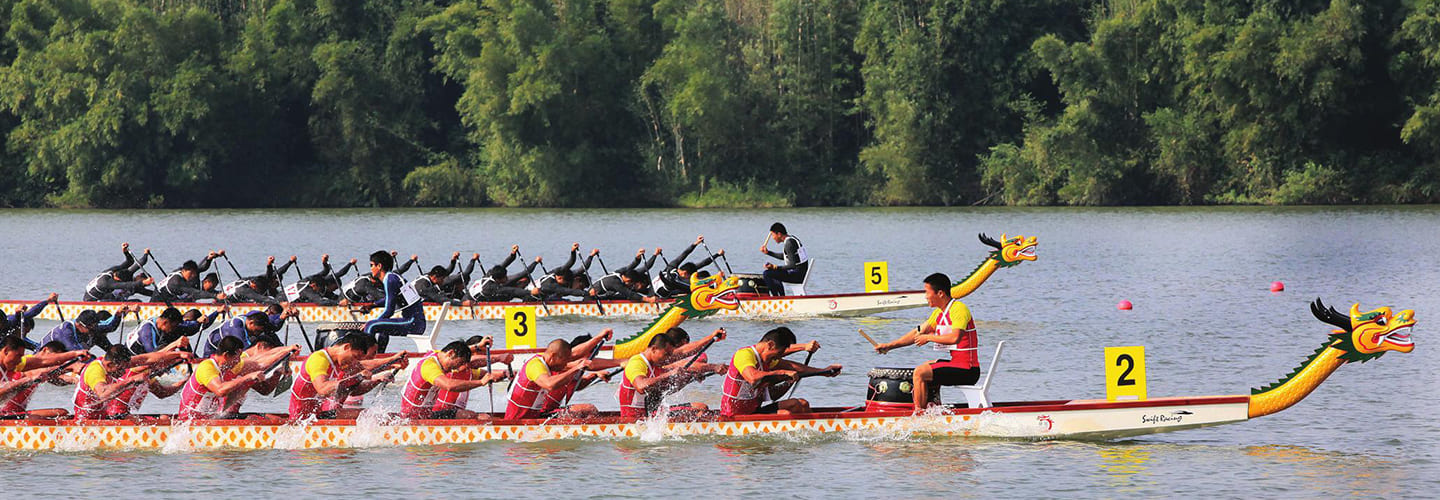
7. Mid-Autumn Festival
It is a harvest festival held on the 15th day of the 8th month of the lunar calendar when the full moon is hanging in the sky. It often falls in September or October during the harvest season when families can get together to give thanks for the harvest.
Family gatherings are an important part of the Mid-Autumn Festival, which is similar to Thanksgiving in the United States.
Famously, people often celebrate the Mid-Autumn Festival using paper Chinese lanterns and eating moon cakes. During this festival, it's customary to gift mooncakes to friends and acquaintances.
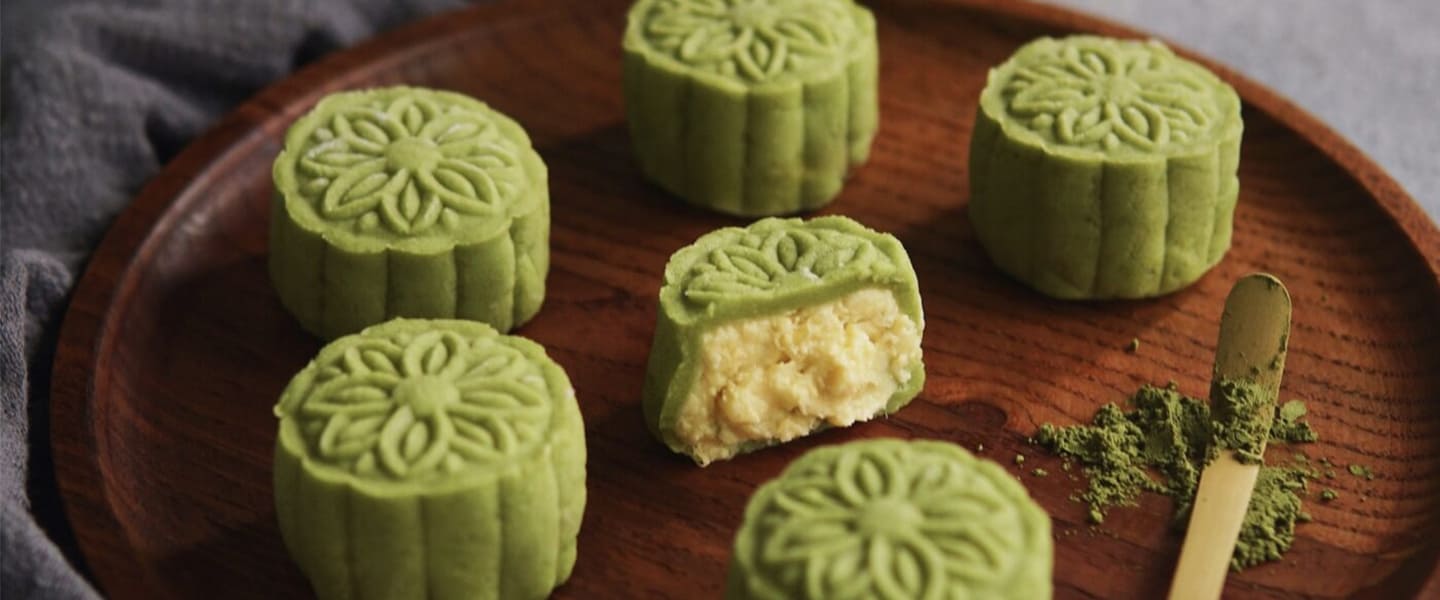
8. National Day
Chinese National Day is the year's final public holiday in China. Celebrated each year on October 1st, National Day commemorates the October 1, 1949 founding of the People's Republic of China.
The National Day celebration includes a major civil-military parade every 5 years as well as the national flag-raising ceremony. The Chinese government also hosts a variety of activities, ranging from concerts to firework shows.
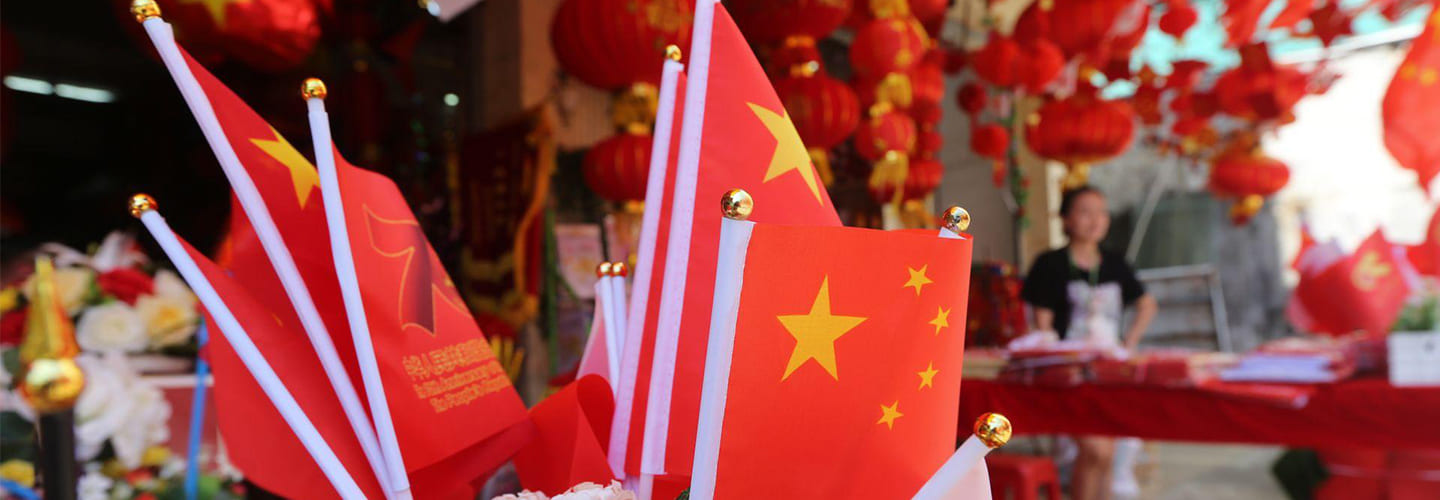
How long do China holidays last?
Date | Holiday | Last |
Jan. 1st - Jan. 3rd | New Year's Day | 3 days |
Jan. 31st - Feb. 6th | Chinese Spring Festival | 7 days |
February 15th | Lantern Festival | 1 day |
April 3rd - April 5th | Qingming Festival | 3 days |
April 30th - May 2nd | Labor Day | 3 days |
June 3rd - June 5th | Dragon Boat Festival | 3 days |
Sept. 10th - Sept. 13rd | Mid-Autumn Festival | 3 days |
Oct. 1st - Oct. 7th | National Day Holiday | 7 days |
Different China holidays have different lengths.
One thing worth noting is the concept of the Golden Week which refers to holidays which last 7 or 8 days. During the Golden Week holiday, almost all businesses, factories as well as government organizations will be closed or low-staffed. This means that production will be slowed down or completely stopped. Airports, sea ports and warehouses will be operating with limited capacity whereas Customs offices will be closed.
Another thing that significantly affects order lead time is the Chinese New Year. Although the official holiday only lasts for about a week, most factories are closed for an entire month, with disruptions lasting even longer than that. All suppliers start to wind down their operations one to two weeks before the Chinese New Years' Eve. And most workers stay in their home provinces for an extra week or two, until the Latern Festival. This explains why most suppliers do not resume operations until two to three weeks after Chinese New Year's Eve.
Is China's factory closed for the holidays?
All these eight marjor China holidays will be observed by most of factories in China. However, expect National Day and Chinese New Year, the other holidays may not have as dramatic of an impact on your order lead times and logistic due to their short period.
We suggest marking your calendars for all the other holidays and asking your suppliers about any potential impact they could have on your goods. And the most importance is to start planning for Chinese New Year as earlier as possible.
On the contrary, tourism and businesses thrive during major holidays, particularly during the Chinese New Year.
Does China celebrate Thanksgiving and Christmas?
Traditionally, Thanksgiving and Christmas are not celebrated in China.
Thanksgiving is a North American holiday celebrated primarily in the United States and Canada. People do not celebrate Thanksgiving in China.
The closest thing to it among Chinese holidays is the Mid-Autumn Festival which is similarly focused on family and being thankful for the year's blessings.
Christmas, however, has started to gain popularity in China in recent years, particularly among younger generations who are interested in Western culture. There’s even a unique Chinese Christmas tradition of gifting red apples on Christmas Eve.

If you work with Chinese manufacturers, you should be well aware of the potential for production delays throughout the year. Although many companies are already aware of their suppliers' Chinese New Year plans, China has a few other known public holidays that could negatively impact lead times and logistics. Therefore, it should be factored into your ordering timeline when issuing purchase orders. This article will provide you with information about China's eight major national public holidays.
Table of Contents:
What are the eight major China holidays? How long do China holidays last? |
Download 2022 China's holiday calender for your desk:

What are the eight major China holidays?
Quickview of Chinese Public Holidays in 2022:
| Date | Holiday | Chinese |
Jan. 1st - Jan. 3rd | New Year's Day | 元旦 |
Jan. 31st - Feb. 6th | Chinese Spring Festival | 春节 |
February 15th | Lantern Festival | 元宵节 |
April 3rd - April 5th | Qingming Festival | 清明节 |
April 30th - May 2nd | Labor Day | 劳动节 |
June 3rd - June 5th | Dragon Boat Festival | 端午节 |
Sept.10th - Sept.13rd | Mid-Autumn Festival | 中秋节 |
Oct. 1st - Oct. 7th | National Day Holiday | 国庆节 |
1. New Year's Day
The first Chinese holiday of the year is New Year's Day, which is the same as in the Western world. People celebrate this holiday on January 1st and schools and public offices are closed for a day.
To distinguish it from the Chinese Lunar New Year, some people refer to New Year's Day as "International New Year."
2. Chinese New Year
Chinese New Year, also known as Spring Festival, is the second major public holiday of the year and also is the most important one. Since it is based on the Chinese lunisolar calendar, the actual date varies from year to year, but it's usually celebrated in late January or early February.
This festival dates back around 4,000 years and is a long-standing tradition in China and other Asian countries such as Vietnam and Singapore.
Like Easter, Christmas, or Thanksgiving, people travel back to their home towns to spend time with their families. Chinese people bring presents and red envelopes, also called "Hongbao", with money inside to give to their loved ones. People will decorate their doors with red paper-cuts wishing their family good fortune and happiness and families will eat together and light firecrackers.

3. Lantern Festival
The festival marks the final day of the Chinese New Year and is celebrated in February or March.
During the festival, people will light lanterns. The lanterns can symbolize that you are letting go of your old self and starting fresh. Just like when in Western people jump down from the chair on New Year's Eve and start planning their new life.

4. Qingming Festival
This festival is also known as Tomb-Sweeping Day or Ancestor's Day, which symbolizes the Chinese people’s deep-rooted respect for their ancestors. Qingming Festival falls on the 15th day after the Spring Equinox, which can be either April 4th, 5th or 6th in any given year.
On this day, Chinese families traditionally clean and sweep their ancestors' tombs. Many people also leave offerings of fake paper money, also known as "hell money," near or on their ancestors' graves so that their loved ones can make purchases in the afterlife.

5. Labor Day
Labor Day is also called May Day in China. This holiday, which honors workers of all types, normally lasts three days.
6. Dragon Boat Festival
With over 2,000 years of history, Dragon Boat Festival is one of the most traditional Chinese festivals. It falls on the fifth day of the fifth month of the Chinese calendar, typically in June on the Gregorian calendar.
There is a variety of stories about the origin of the festival, but the best-known legend behind the Dragon Boat Festival is that it commemorates the death of Qu Yuan, a poet and politician who lived circa 340 to 278 BCE.
According to legend, Qu Yuan was accused of treason and expelled from politics. In despair, he committed suicide by drowning himself in the Miluo River. He was popular with the local people, and after his death, they rushed to their boats to save him or at least recover his body. This is the origin of the festival’s most famous activity: dragon boat races.
Several traditional dishes are served during the festival, including zongzi (sticky rice dumplings) and realgar wine.

7. Mid-Autumn Festival
It is a harvest festival held on the 15th day of the 8th month of the lunar calendar when the full moon is hanging in the sky. It often falls in September or October during the harvest season when families can get together to give thanks for the harvest.
Family gatherings are an important part of the Mid-Autumn Festival, which is similar to Thanksgiving in the United States.
Famously, people often celebrate the Mid-Autumn Festival using paper Chinese lanterns and eating moon cakes. During this festival, it's customary to gift mooncakes to friends and acquaintances.

8. National Day
Chinese National Day is the year's final public holiday in China. Celebrated each year on October 1st, National Day commemorates the October 1, 1949 founding of the People's Republic of China.
The National Day celebration includes a major civil-military parade every 5 years as well as the national flag-raising ceremony. The Chinese government also hosts a variety of activities, ranging from concerts to firework shows.

How long do China holidays last?
Date | Holiday | Last |
Jan. 1st - Jan. 3rd | New Year's Day | 3 days |
Jan. 31st - Feb. 6th | Chinese Spring Festival | 7 days |
February 15th | Lantern Festival | 1 day |
April 3rd - April 5th | Qingming Festival | 3 days |
April 30th - May 2nd | Labor Day | 3 days |
June 3rd - June 5th | Dragon Boat Festival | 3 days |
Sept. 10th - Sept. 13rd | Mid-Autumn Festival | 3 days |
Oct. 1st - Oct. 7th | National Day Holiday | 7 days |
Different China holidays have different lengths.
One thing worth noting is the concept of the Golden Week which refers to holidays which last 7 or 8 days. During the Golden Week holiday, almost all businesses, factories as well as government organizations will be closed or low-staffed. This means that production will be slowed down or completely stopped. Airports, sea ports and warehouses will be operating with limited capacity whereas Customs offices will be closed.
Another thing that significantly affects order lead time is the Chinese New Year. Although the official holiday only lasts for about a week, most factories are closed for an entire month, with disruptions lasting even longer than that. All suppliers start to wind down their operations one to two weeks before the Chinese New Years' Eve. And most workers stay in their home provinces for an extra week or two, until the Latern Festival. This explains why most suppliers do not resume operations until two to three weeks after Chinese New Year's Eve.
Is China's factory closed for the holidays?
All these eight marjor China holidays will be observed by most of factories in China. However, expect National Day and Chinese New Year, the other holidays may not have as dramatic of an impact on your order lead times and logistic due to their short period.
We suggest marking your calendars for all the other holidays and asking your suppliers about any potential impact they could have on your goods. And the most importance is to start planning for Chinese New Year as earlier as possible.
On the contrary, tourism and businesses thrive during major holidays, particularly during the Chinese New Year.
Does China celebrate Thanksgiving and Christmas?
Traditionally, Thanksgiving and Christmas are not celebrated in China.
Thanksgiving is a North American holiday celebrated primarily in the United States and Canada. People do not celebrate Thanksgiving in China.
The closest thing to it among Chinese holidays is the Mid-Autumn Festival which is similarly focused on family and being thankful for the year's blessings.
Christmas, however, has started to gain popularity in China in recent years, particularly among younger generations who are interested in Western culture. There’s even a unique Chinese Christmas tradition of gifting red apples on Christmas Eve.
Popular Articles
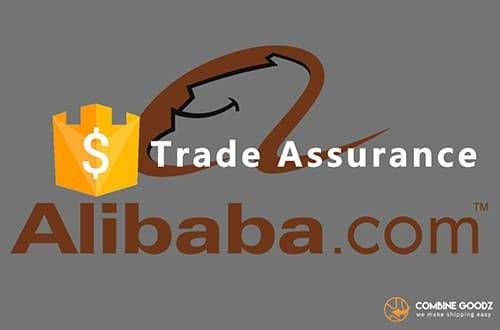
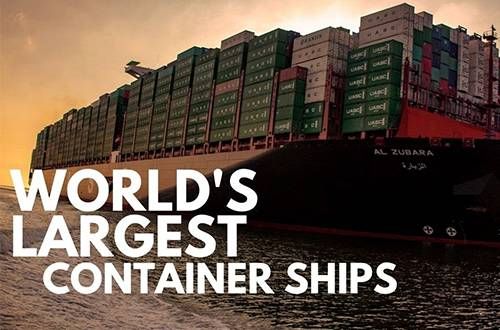
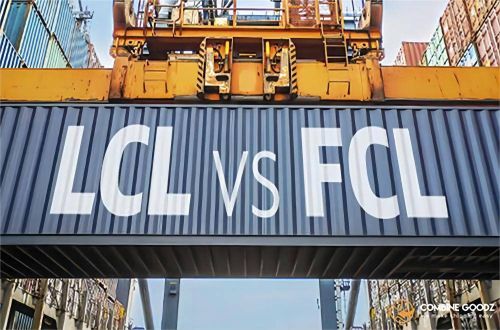
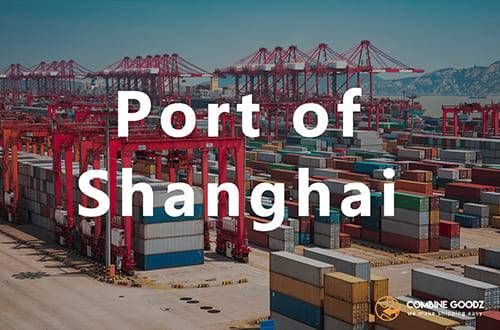
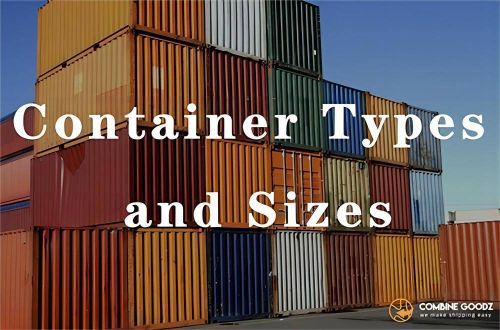
Categories
Share
Prev:Holiday in India
Next:ZIM
The latest blogs and insights on what is happening in international transport and logistics.